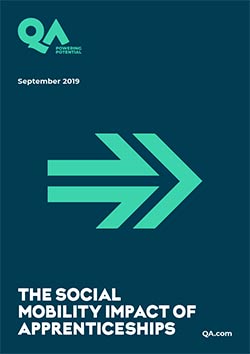Pupils from deprived backgrounds are just as likely to join an #Apprenticeship as their less deprived peers

The Social Mobility Impact of #Apprenticeships
There is little doubt that the Apprenticeship sector has been through a turbulent period. Many of us leading Apprenticeship businesses have been left managing challenges on all sides.
The shifting sands of policy, funding and the ambiguity caused by the new Standards has left many of us rooted in trying to improve how and what we are delivering.
In the midst of this it is easy to stop asking “so what?” This is why the research paper we have just released on the Social Mobility Impact of Apprenticeships is so important to me.
Quite simply, it has been a refreshing opportunity to step back and think again about our imprint.
Data and research like this validates what most of us know and see on a daily basis.
Last year I caught up with a young man who I had first met in 2013 when attending an observation visit with an Assessor.
Nazir came along to our first Apprenticeship Alumni event because he wanted to tell us about the impression his Apprenticeship experience had left on him. From a lad that was just 16 on a level 3 tech programme, Naz progressed through to a level 4 project management programme and then onto a senior project management role at a leading bank. He is also married with 2 children, whose lives have been made better on account of his inspiring and determined efforts leading to an incredible career.
Or there is Roberta, who was our first apprentice to attain GCSE through to degree level qualifications through our Apprenticeships. It was a first too for her family where no-one else has yet been to University. The sense of achievement and the pride are evident in both Roberta and her family. A young woman who is already progressing incredibly successfully in the male dominated world of STEM. A testimony to how Apprenticeships can unlock and power potential.
I love these stories and I am delighted that as well as coming up with a few individual case studies that show the success of exemplar apprentices (I’m sure most providers can do this), we can also show the much broader success and positive impact of Apprenticeship programmes through this report.
Our research shows that Apprenticeships are unique in that they have no access gap.
Pupils from deprived backgrounds are just as likely to join an Apprenticeship as their less deprived peers, whereas for the most selective universities, deprived pupils are 43% less likely to attend. Of course, there are meaningful variations between different providers and different Apprenticeships.
I was particularly pleased to see that our technical Apprenticeships have 18% more learners from deprived backgrounds than the national average which is critical to developing talent in a much publicised under skilled area of our economy.

The report makes a series of recommendations that arise from this data, including steps to help improve the transparency on the social mobility performance of Apprenticeships (particularly post programme):
|
This is vital when the research also tells us that the majority of apprentices said their teachers had not discussed Apprenticeship options with them.
Similarly a majority of teachers said they would rarely or never advise their high-performing students to choose an Apprenticeship over University. This is crazy when you look at the impact and success of Apprenticeships!
Nearly all apprentices report that they had seen beneficial influences on their careers. The majority felt they were better at doing their job and felt satisfied in their job since starting an Apprenticeship. Nationally, approximately half of apprentices at level 2/3 received a pay rise on completing their Apprenticeship.
For QA’s (majority technical and higher level) programmes, 92% of apprentices saw a pay rise. Higher pay is of course a positive outcome in and of itself, but it also recognises that an employee’s productivity, skill set and economic value to the employer and the economy has grown.
There is more we suggest should be done to raise wages whilst apprentices are on programme, there is still lots to be done to address falling achievement rates, but take a step back and the overall picture is a positive one.
Whilst this report finds there is significant variation between programmes and providers, it is clear that Apprenticeships are an outstanding investment in terms of economic return. More importantly, they genuinely do provide a social mobility impact that can be quantified and one which we should all be much more proud of.
Ben Pike, Managing Director, QA Ltd
About Ben Pike: Ben’s been one of our Managing Directors since September 2008. He’s passionate about developing the next generation of talent.
He’s worked in senior leadership roles in learning for over 15 years. From 2002 to 2008, he was Operations Director and Learning Services Director at Xpertise. He helped build Xpertise into a leading learning business – and played a huge part making it happen.
Ben joined QA as Managing Director after QA merged with Xpertise – in 2008. Back then, he led our managed learning services. Since, Ben’s been the leader of our apprenticeships – which empower tonnes of young people to get on the digital career ladder. Now, he leads all the regional sales teams at QA.
QA is the UK’s leading learning organisation providing training, consultancy, apprenticeships and post graduate degrees on a range of technical, business and leadership subjects. With over 22 UK training centres – including their Apprenticeships and Consulting Academies – and a range of online learning options, QA offer an unparalleled set of learning solutions to both private and public sector organisations.










Responses